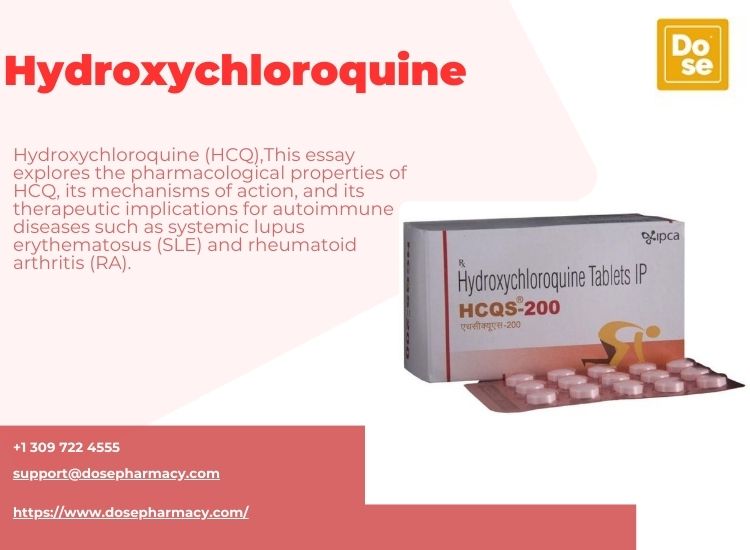Malaria remains one of the deadliest infectious diseases worldwide, affecting millions of people each year. The quest for effective treatments has led to the development and use of various medications, among which Hydroxychloroquine Sulfate hydroxychloroquine tablet stands out as a notable remedy. This article explores the significance of HCQS 200mg in the treatment of malaria, its mechanisms of action, efficacy, and the broader implications of its use in combating this pervasive disease.
Understanding Malaria
Malaria is caused by Plasmodium parasites, which are transmitted to humans through the bites of infected Anopheles mosquitoes. The most common and deadly species are Plasmodium falciparum and Plasmodium vivax. The disease manifests with symptoms such as fever, chills, headache, and in severe cases, can lead to complications like anemia, cerebral malaria, and death.
Introduction to HCQS 200mg
Hydroxychloroquine Sulfate (HCQS) is a derivative of chloroquine, a well-known antimalarial drug. Initially developed for the treatment of malaria, HCQS has also found use in autoimmune diseases such as rheumatoid arthritis and lupus due to its immunomodulatory effects. The standard dosage of HCQS for malaria prophylaxis and treatment is typically 200mg.
Mechanisms of Action
HCQS exerts its antimalarial effects primarily through two mechanisms:
-
Inhibition of Hemozoin Formation:
- Plasmodium parasites digest hemoglobin from the host’s red blood cells, producing toxic heme as a byproduct. The parasite polymerizes this heme into a non-toxic form called hemozoin.
- HCQS interferes with this polymerization process, causing an accumulation of toxic heme within the parasite, leading to its death.
-
Immune Modulation:
- HCQS has immunomodulatory properties, which enhance the body’s immune response against the parasite. It increases the pH within parasite lysosomes and endosomes, disrupting their function and impairing the parasite’s ability to invade host cells.
Efficacy of HCQS 200mg in Malaria Treatment
Numerous studies have demonstrated the efficacy of HCQS 200mg in both the prophylaxis and treatment of malaria:
-
Prophylactic Use:
- HCQS 200mg is effective in preventing malaria in endemic regions. Regular intake of the drug reduces the risk of infection by maintaining therapeutic levels in the bloodstream, which inhibits the early stages of parasite development.
-
Therapeutic Use:
- In the treatment of active malaria infections, HCQS 200mg has shown to rapidly reduce parasite load, alleviate symptoms, and prevent complications. It is particularly effective against Plasmodium vivax and Plasmodium ovale, with variable efficacy against Plasmodium falciparum due to emerging resistance in some regions.
Safety and Side Effects
While HCQS 200mg is generally well-tolerated, it is essential to be aware of potential side effects and contraindications:
-
Common Side Effects:
- Gastrointestinal disturbances such as nausea, vomiting, and diarrhea.
- Headache, dizziness, and blurred vision.
-
Serious Side Effects:
- Retinopathy: Prolonged use of HCQS can lead to retinal damage, necessitating regular eye examinations for long-term users.
- Cardiomyopathy: Rare cases of heart muscle disease have been reported, especially with higher doses or prolonged use.
-
Contraindications:
- Individuals with known hypersensitivity to hydroxychloroquine or related compounds.
- Patients with pre-existing retinopathy or significant visual field changes.
Addressing Resistance
The emergence of drug-resistant strains of Plasmodium, particularly Plasmodium falciparum, poses a significant challenge to the efficacy of HCQS. Resistance to chloroquine and hydroxychloroquine has been documented in various parts of the world, necessitating the use of combination therapies and the development of new antimalarial drugs.
Combination Therapies
To counteract resistance and enhance treatment efficacy, HCQS is often used in combination with other antimalarial drugs. Artemisinin-based combination therapies (ACTs) are the current gold standard for treating Plasmodium falciparum malaria. These combinations provide a synergistic effect, reducing the likelihood of resistance development and ensuring a higher treatment success rate.
Global Implications and Future Directions
The use of HCQS 200mg in the battle against malaria has broader implications for global health:
-
Public Health Impact:
- Widespread use of HCQS has contributed significantly to the reduction of malaria incidence and mortality rates, particularly in endemic regions.
-
Accessibility and Affordability:
- HCQS is relatively affordable and accessible, making it a viable option for malaria prevention and treatment in low-resource settings.
-
Research and Development:
- Ongoing research is focused on developing new antimalarial drugs and combination therapies to overcome resistance and improve treatment outcomes. The role of HCQS in these efforts continues to be significant, providing a foundation for new therapeutic strategies.
Conclusion
Hydroxychloroquine Sulfate 200mg remains a potent remedy in the battle against malaria, offering both prophylactic and therapeutic benefits. Despite challenges such as emerging resistance and potential side effects, its continued use, particularly in combination therapies, plays a crucial role in global malaria control efforts. As research progresses and new treatments are developed, HCQS will likely remain an integral part of the multifaceted approach required to combat this persistent and deadly disease. Read More….

